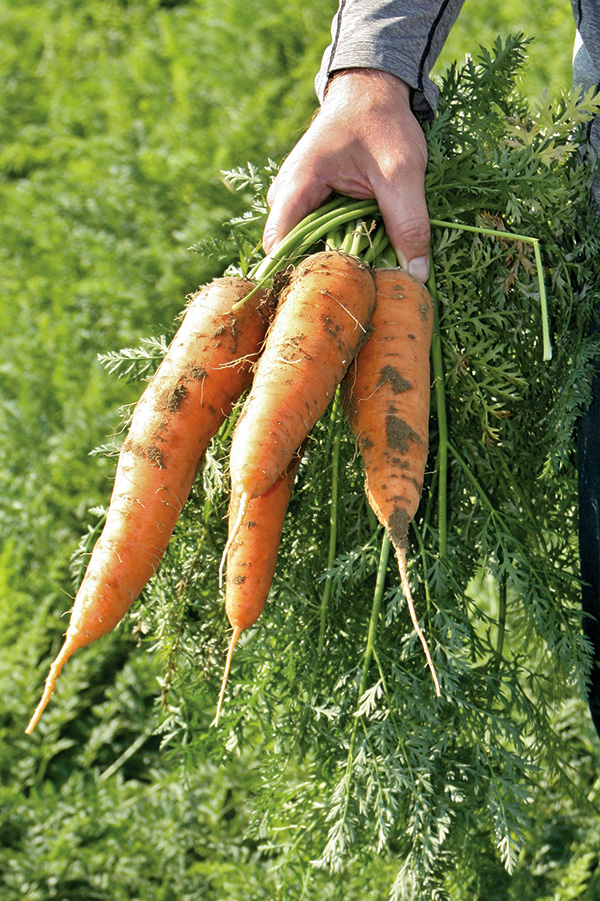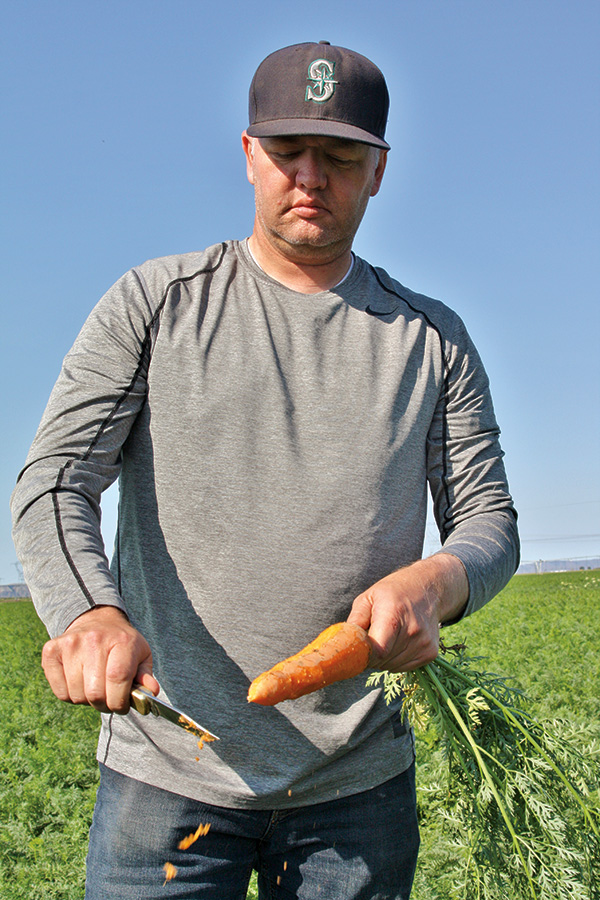Story and photos by Denise Keller, Editor
It seems Heritage Farms, a family farm in Royal City, Washington, is appropriately named. The Bergeson and Christensen families utilize four generations of farming know-how, balanced with a willingness to adapt, to remain an independent family farm in an industry increasingly characterized by consolidation.
Season-Long Management
Two sets of brothers – Chad and Ian Bergeson and their cousins Aaron and Dan Christensen – manage the family farm, which includes 700 acres of carrots. With the crop bound for the diced carrot market, the growers strive for large carrots to give processors more product and less waste. Most years, they grow Red Cored Chantenay, aiming for good stand and uniform, smooth, sweet carrots.
Abundant sunshine and long summer days, as well as mostly mild weather during harvest, makes the Royal Slope, located in Central Washington, well suited for carrot production, the growers say. However, because carrots are one of the first crops to be planted in the spring and among the last to be harvested in the fall, weather can also present the greatest challenge to growing carrots in the region.
After planting in late March or early April, carrots are slow to establish during the first couple months, especially when cold temperatures delay emergence. Windy conditions common in spring, coupled with the area’s sandy soil, can make it difficult to keep carrots in the ground.
“The wind blows the sand in a way that it can damage the carrots, or if the wind blows enough, it can blow out the field,” Ian describes. “It’s a challenge to get the carrots out of the ground and big enough that the wind can’t damage them.”
The growers say that’s where soil moisture becomes important early in the season. To help prevent wind damage, they pre-irrigate all their fields to form good dirt clods. In fields that are particularly sandy, they plant a wheat cover crop to provide protection for the new carrot plants and keep soil from blowing away.
Aside from weather, yellow nutsedge also poses a threat to carrots, onions and other local crops. While chemicals are available to stunt the vigorous weed, the growers say they lack an effective product to kill it. Mildews and blights also remain on the radar as potential problems that can infest a carrot crop, but the growers have been able to control diseases with strategic irrigation practices and a thorough chemical regime.
At the end of the day, careful management helps the farm deliver a high quality product to its customers, the growers say.
“Carrots are like any crop; you need the right fertility and the right irrigation. And I spend a lot of time in the fields with a shovel monitoring what’s going on out there. It changes year to year and field to field, so it’s important to spend time in the field keeping on top of what’s happening,” Chad explains. “Usually, if you’re in the field enough, you can catch some of those possible diseases early enough that you’re able to do something to treat them.”
Heritage Farms begins digging carrots in October, and harvest often extends into December. Given the timing, an early freeze is always a concern.
Rainfall during these months can also make digging difficult. To contend with wet, muddy conditions, Heritage Farms uses a sugar beet digger to harvest carrots, whereas most other dicer carrots in the area are harvested with potato diggers, according to the Bergesons.
This has helped minimize weather delays during harvest. Because soil is lifted onto a potato digger and then has to fall through its chains, the equipment doesn’t work well in mud, the growers say. A beet digger, on the other hand, has angled lifter wheels that move directly over the rows and pull up the carrots, leaving most of the soil in place.

From left, Aaron Christensen, Dan Christensen, Chad Bergeson and Ian Bergeson discuss the quality of this year’s carrot crop.
Four Generations and Counting
In addition to carrots, Heritage Farms grows wheat, beans and corn as rotational crops, as well as 120 acres of apples. The farm has dabbled in the production of other crops through its four-generation history.
Chad, Ian, Aaron and Dan say their great-grandfather raised cattle and grew grains, hay and potatoes in Kittitas, Washington. Their grandpa and his three brothers moved to Royal City in the late 1950s after the Columbia Basin Project brought irrigation to the Royal Slope and were among the first families to farm there. The farm began growing carrots in 1980. About a decade later, their fathers took the reins.
After growing up on the farm and attending college, Chad returned to the farm in 2002, Ian came home in 2012, Aaron followed the next year, and Dan joined the operation in 2017. Today, the four growers manage the family farm, combining what has worked in the past with what will be necessary to be profitable in the future.
“I don’t think you can totally discount things that previous generations have done that have been successful,” Chad says. “You have to take into account that experience, and it helps when they acknowledge that there are things that come along to help a process be more efficient or effective.”
“For any decision you’re making, whether you’re going to change a process or the way you grow something, there has to be a reason to do it,” Dan adds. “In the end, you’re trying to make money, so hopefully that decision either makes you more efficient or increases yield or gives you a better quality product.”
The growers say there’s still value in today’s ag market for quality products. This plays well for family farms. While large conglomerates focus on scale, efficiency and control of the market, Dan says small farms are all about quality.
“We have to concentrate on quality and doing it right. As long as we can control our costs, I think we can survive,” he adds.
In addition to quality, Heritage Farms’ diversification and the growers’ commitment to family are key to thriving as a family farm.
“You have to want to remain a family farm,” Ian comments. “Family is important to us.”
The growers want to be able to pass on land and a legacy to the next generation. They’re working to teach their children about farming and responsibility. With some of the growers’ oldest kids starting to help more on the farm, the next generation is taking its baby steps in becoming the fifth generation of Heritage Farms.



